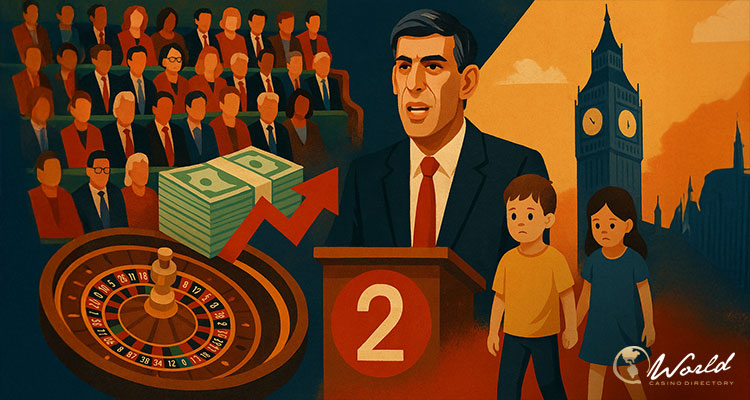Rachel Reeves, United Kingdom’s Chancellor of the Exchequer, is facing mounting pressure from her own backbenches as more than 100 Labour MPs demand that gambling companies pay higher taxes to help finance the abolition of the two-child benefit cap. The push, which aligns with proposals advanced by Gordon Brown and the Institute for Public Policy Research (IPPR), has gained considerable traction ahead of the Chancellor’s Budget scheduled for 26 November.
In a joint letter signed by 101 MPs, Alex Ballinger and Beccy Cooper of the All-Party Parliamentary Group on Gambling Reform stressed that there is a “compelling” case for a “targeted levy on harmful online gambling products.” They argue the proceeds should be used to dismantle the controversial benefit cap, which has been widely criticized as exacerbating child poverty.
The MPs contend that the betting sector, despite strong profit margins, contributes relatively little to the United Kingdom economy. Many companies base themselves offshore to reduce their tax liabilities while employing limited numbers domestically. Ballinger summed up the argument: “No child should be growing up in poverty while gambling companies continue to enjoy record profits.”
IPPR Plan Could Generate Billions for Poverty Relief
Central to the campaign is the IPPR’s blueprint for a substantial increase in gambling duties. The think tank’s analysis suggests reforms could raise £3.2 billion annually by 2026/27, enough to finance both the removal of the two-child cap and the broader household benefit cap. According to the IPPR, this would potentially lift 500,000 children out of poverty.
Their recommendations include:
- Raising the Remote Gambling Duty on online slots, poker, and bingo from 21% to 50%.
- Increasing the Machine Games Duty on cash-prize slot machines from 20% to 50%.
- Doubling the General Betting Duty on sports betting from 15% to 30%.
At present, the gambling industry also benefits from a VAT exemption, something critics say unfairly shields the sector despite its growing impact on public services. Ballinger warned that gambling-related harms already cost the Exchequer more than £1 billion annually.
Human Impact of the Benefit Cap
The policy’s effect is felt acutely by families like that of Thea Jaffee, a single parent of three young children who works full-time but struggles to cover expenses. Speaking to ITV News, she described the financial strain: “I’m on £45,000 a year. I bring home, after taxes, £2,800 a month, but the nursery fees for the two toddlers are £2,600 a month, so right there, we already have a problem.”
Jaffee explained that lifting the two-child limit would leave her about £230 better off each month, easing daily choices such as buying new shoes or allowing her children to attend school activities. “It would make such a huge difference to day-to-day choices,” she said.
Reeves Responds as Industry Pushes Back
The Chancellor has indicated she is open to the idea, telling ITV News that gambling tax changes are “on the table.” Reeves noted, “I didn’t need MPs or former chancellors to tell me to launch an enquiry into gambling taxation. I did that as chancellor, and I’ll set out the plans on the taxation of gambling — and indeed of other areas — in my Budget on 26 November.”
Reeves has emphasized that her government has already taken measures to reduce child poverty, including expanded childcare, wider access to free school meals, and an increased minimum wage. She reiterated last week: “Of course as a Labour Chancellor I’m determined to lift children out of poverty and we’ve made a commitment that in our time in office there will be fewer children in poverty at the end of this parliament than at the beginning.”
The Betting and Gaming Council (BGC), which represents leading operators including Flutter, Entain, and Bet365, has sharply criticized the proposals. The group argues that its members already contribute £6.8 billion to the economy, £4 billion in tax, and support 109,000 jobs. In a statement, the BGC said: “We strongly oppose proposals to raise taxes on the regulated betting and gaming industry. Such a move would be short-sighted, harming jobs, investment, and sports funding, while failing to deliver more revenue.”
The council further warned that higher taxes could push bettors toward unregulated markets, which it described as unsafe and untaxed.
Debate Set to Intensify Before Budget
As the Budget approaches, Labour’s child poverty taskforce is expected to recommend scrapping the two-child limit, a policy introduced in 2015 under the Conservatives. The taskforce’s report, though delayed, is anticipated to be central to upcoming debates.
The issue has also sparked division within Labour ranks. Education Secretary Bridget Phillipson recently described the cap as “spiteful” and confirmed scrapping it is “on the table.” Andy Burnham, Mayor of Greater Manchester, branded the policy “abhorrent” and “the worst of Westminster.”
While industry leaders warn of economic consequences, campaigners such as Paddy Power co-founder Stewart Kenny argue that online casinos, described by him as the “crack cocaine of gambling,” can afford to shoulder higher levies. With nearly half of Labour’s backbench MPs now backing reform, pressure is growing on Reeves to act decisively when she unveils her Budget in November.



